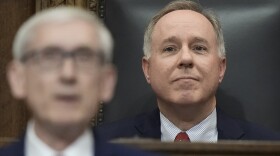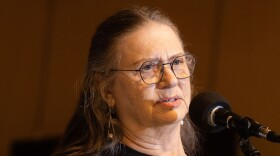Fifty years ago on Wednesday, the first Earth Day kicked off with a huge bang. An estimated 20 million people rallied to the call to protect our most fundamental resources: land, water, and air.
Its founder, Gaylord Nelson, served as Wisconsin governor before moving on to the U.S. Senate. Here's an excerpt from his 1970 speech delivered at MATC in Milwaukee on the eve of the first Earth Day:
"Our goal is not just an environment of clean air and water and scenic beauty while forgetting about the worst environments in America. Our goal is an environment of decency, quality and mutual respect for all human beings and all other living creatures. Our goal is a decent environment in the deepest sense and it will require a long sustained, political, moral, ethical and financial commitment, far beyond any commitment ever made by any society in the history of man.”
While the goal from his first Earth Day speech has yet to be achieved, the call has been heard by many. We spoke with three people who've been profoundly impacted by Earth Day:
Tia Nelson
As the daughter of Gaylord Nelson, it's only natural to think that Tia Nelson was influenced by her father. But, perhaps surprisingly, the first Earth Day doesn't stick out too much to her.
"To tell the truth, I didn’t have a strong memory of what I was doing. But a friend told me I was picking up trash at my middle school," she says.

Though, Earth Day's message did stick, as she's now the climate director for the Outrider Foundation based in Madison. As Earth Day's 50th anniversary approached, she tapped into her dad.
"Of course, I felt a great sense of duty to tell my dad’s story and inspire youth to see the power of individual action that was so well demonstrated that first Earth Day. But I didn’t want to just reflect on the past," Tia Nelson says.
READ: Daughter Remains Committed To Earth Day Founder, Wisconsin's Gaylord Nelson
So the foundation created a short film.
https://www.youtube.com/watch?v=Cwnkw5pnG38&feature=youtu.be
"I thought that Bob [Inglis'] voice and Varshini Prakash, cofounder of the Sunrise Movement — one of the most powerful youth activist groups in the country — would be perfect bookends to this story, in that they demonstrated the multigenerational and bipartisan elements that were so critical to the success of the first Earth Day,” Tia Nelson says.
Bob Inglis
When the first Earth Day happened, Bob Inglis was a 10-year-old living in Bluffton, South Carolina, a very small town. He was once a staunch climate change skeptic but is now a believer.
Earth Day messages didn't move him until he was running for Congress and his son was about to vote for the first time.
"He said, 'Dad I’ll vote for you, but you’re going to have to clean up your act on the environment,' " Inglis says.

That was step one of what Inglis describes as a gradual transformation.
"[The final step was] something of a spiritual awakening, interacting with an Australian climate scientist and being inspired by his faith and his commitment to love God and love people by caring for the creation. I came home then and introduced the Raise Wages Cut, Carbon Act of 2009,” Inglis says.
While his bill failed and his popularity faded in what he describes as his very conservative district, he continues to promote climate action. Inglis created an organization called republicEn, which he says works "to convince fellow conservatives that there is an exciting free enterprise answer to climate change."
John Janssen
Fifty years ago, John Janssen knew nothing of Gaylord Nelson’s hope to mobilize the public around environmental issues. He was busy in his lab trying to get his fisheries and wildlife degree at Alma College, a private college in Michigan.
"But my professor told me you have to go to this meeting at University of Michigan about teach-ins about the environment,” Janssen says.

So, he drove two hours down to Ann Arbor and couldn’t believe what he saw.
“To walk into a room that was just crowded with kids my age, other upper-class college students waiting for this thing to begin. And according to the records, there were 50 of us – that is 50 people representing 50 colleges and universities, all of us trying to figure out what was going on with having teach-ins about the environment,” Janssen says.
He and a friend pulled together an event at their school, filling their small gym. But in Ann Arbor, Mich., 14,000 people gathered for its university’s teach-in — a month before the first official Earth Day.
"I like to bring up University of Michigan because people always associate Earth Day with Gaylord Nelson and that’s OK, but this was really grassroots, students doing the organizing,” Janssen says.
John Janssen, Bob Inglis and Tia Nelson each have unique takes on the importance of the moment, but they stand unified on the importance of climate action.
In Tia Nelson's words, while the climate crisis is the biggest environmental challenge humanity has ever faced, "there is incredible power in individual action and I want people to be inspired and feel that sense of agency and empowerment and unite to address this challenge."
Have an environmental question you'd like WUWM's Susan Bence to investigate? Submit below.
_







